Israel has intensified its assault on Gaza, as Palestinian militants continue to fire rockets into Israel on the fifth day of hostilities.
Israel's military said air and ground forces were involved in attacks on Friday but had not entered Gaza.
Meanwhile, clashes between Palestinians and the Israeli security forces spread across much of the occupied West Bank.
At least 122 people have been killed in Gaza and eight have died in Israel since the fighting began on Monday.
Jewish and Israeli-Arab mobs have also been fighting within Israel, prompting its president to warn of civil war.
Defence Minister Benny Gantz ordered a "massive reinforcement" of security forces to suppress the internal unrest that has seen more than 400 people arrested.
Police say Israeli Arabs have been responsible for most of the trouble and reject the accusation that they are standing by while gangs of Jewish youths target Arab homes.
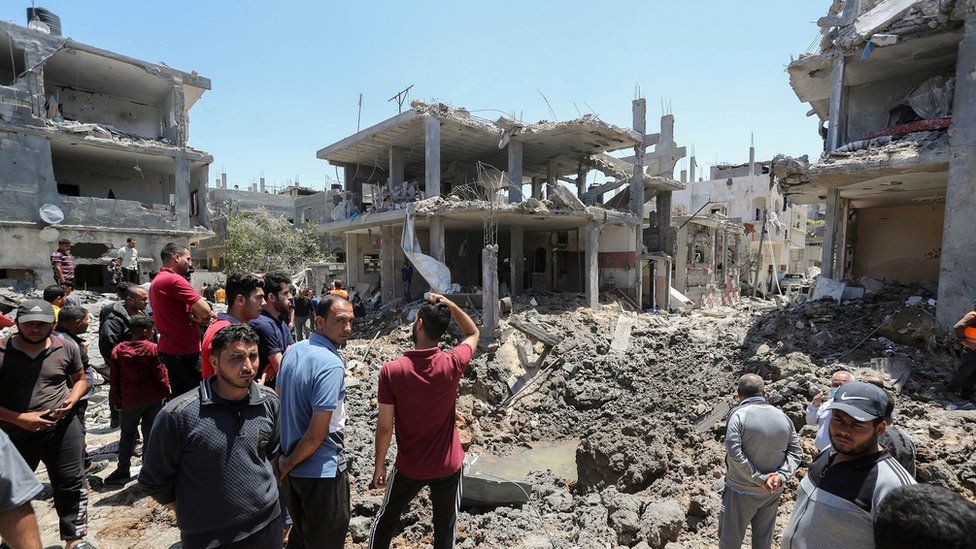
This week's violence in Gaza and Israel is the worst since 2014. It came after weeks of rising Israeli-Palestinian tension in East Jerusalem which culminated in clashes at a holy site revered by both Muslims and Jews. Hamas, the militant group that rules Gaza, began firing rockets after warning Israel to withdraw from the site, triggering retaliatory air strikes.
In Gaza, Palestinians fearing an incursion by Israeli troops have been fleeing areas close to the border with Israel. Residents who had left Shejaiya in Gaza City said shells had been falling on homes.
"We felt like we were in a horror movie," said local resident Salwa Al-Attar, who escaped the bombardment with her family. "The planes were above us, and the tanks and navy were bombing - and we could not move. The children, women and men were screaming."
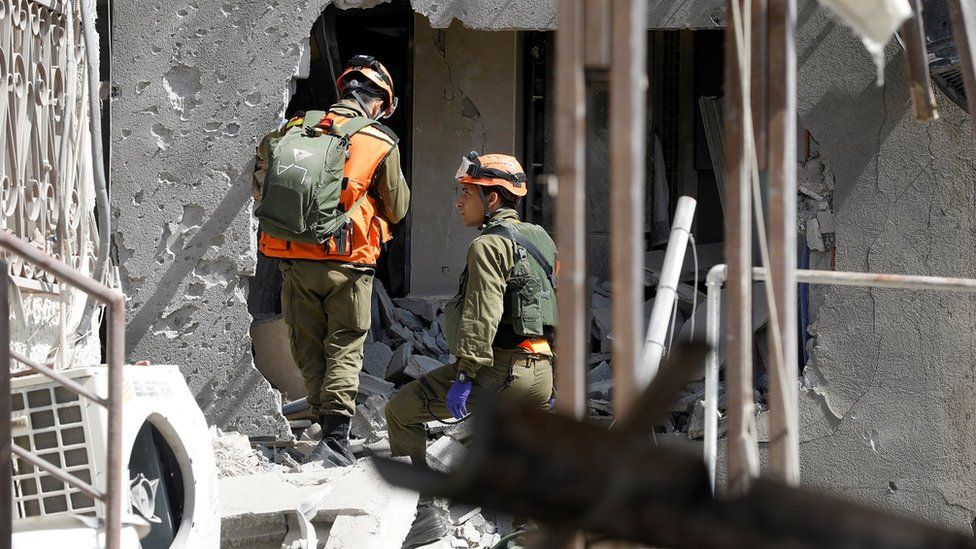
The Israeli military said it had conducted an operation overnight to destroy a network of Hamas tunnels that it dubbed "the metro", but no troops had entered Gaza. It added that - over the course of Thursday evening and Friday morning - 220 more projectiles were fired from the Gaza Strip.
In southern Israel, an 87-year-old woman died after falling on her way to a bomb shelter near Ashdod. Other areas including Ashkelon, Beersheba and Yavne were also targeted.
Gaza's health ministry said 31 children were among those killed since fighting began, and many other civilians have died. Another 900 Gazans have also been wounded. Israel says dozens of those killed in Gaza were militants, and some of the deaths were caused by misfired rockets from Gaza.
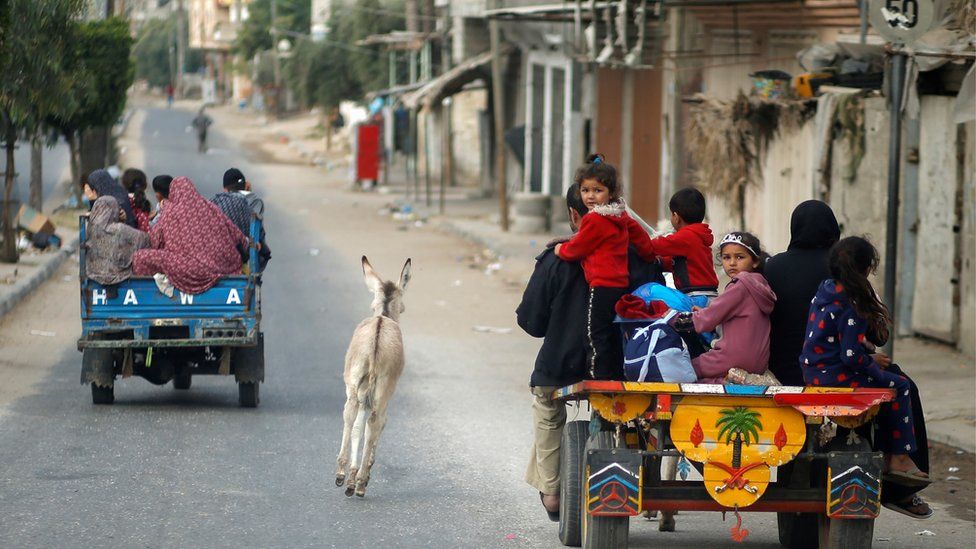
In a statement released early on Friday morning, Israeli PM Benjamin Netanyahu said the country's military operation against Palestinian militants would continue for "as long as necessary". He added that Hamas would pay a heavy price, as would other "terrorist groups".
A Hamas military spokesman said the group was ready to teach Israel's military "harsh lessons" should it decide to go ahead with a ground incursion.
Also on Friday, there were protests at the Jordanian and Lebanese borders with Israel in support of the Palestinians. One man died after being hit by Israeli shell fire while protesting, state media in Lebanon reported.
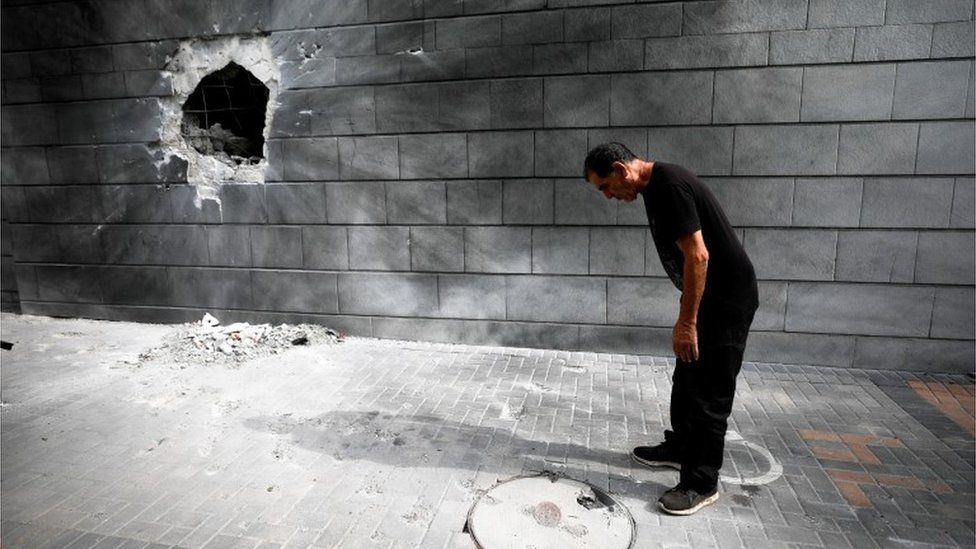
On Thursday, Israel's military called up 7,000 army reservists and deployed troops and tanks near its border with Gaza. It said a ground offensive into Gaza was one option being considered but a decision had yet to be made.
'We didn't want this conflict'
As fighting entered its fifth day, United Nations Secretary General António Guterres called for "an immediate de-escalation and cessation of hostilities in Gaza and Israel".
His plea echoed that of other diplomats - including from Israel's ally the US - but appeals to Israeli and Palestinian leaders have so far failed to produce a ceasefire agreement.
A senior Hamas official has said the group is ready for a "reciprocal" ceasefire if the international community pressures Israel to "suppress military actions" at the disputed al-Aqsa Mosque in Jerusalem.
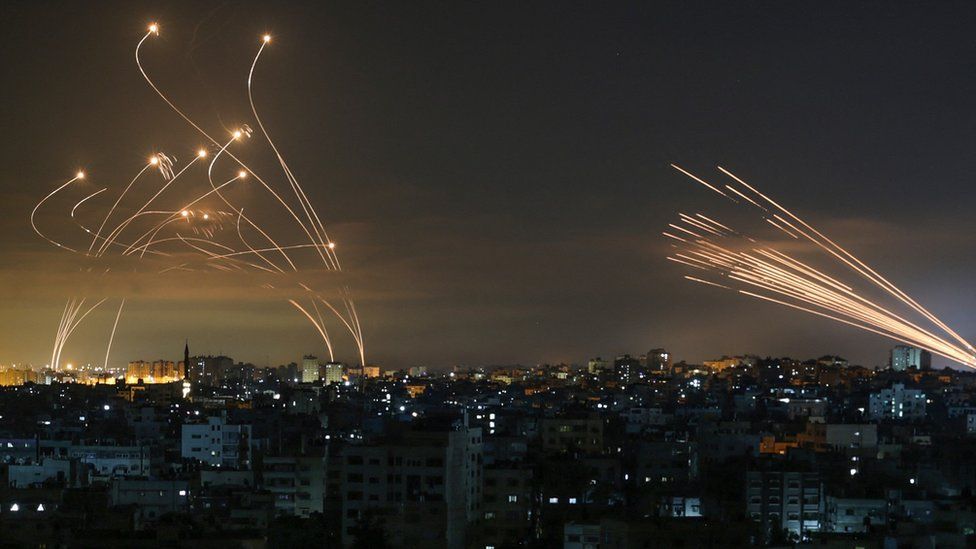
However, a senior adviser to Mr Netanyahu told the BBC that international calls for restraint were misplaced.
"We didn't want this conflict, but now that it's started it has to end with a sustained period of quiet," said Mark Regev. "That can only be achieved by Israel taking out Hamas - their military structure, their command and control."
Israel has also called up 10 reserve border patrol companies to help tackle the worst unrest between Arab and Jewish communities for many years.
Mr Netanyahu has proposed introducing "administrative detention" for rioters. The controversial measure would allow authorities to detain people for extended periods of time without charge.
President Reuven Rivlin described the outbreaks of rioting in several towns and cities as "senseless civil war".
Meanwhile, attempts by parties in Israel to form a coalition to replace Mr Netanyahu's government following inconclusive elections in March appear to have collapsed after a key right-wing leader pulled his party out of negotiations, calling the hostilities a "reality changing event", local media say.
Naftali Bennett is now in discussions with Mr Netanyahu's Likud party to try to form a "broad national unity government", according to reports.
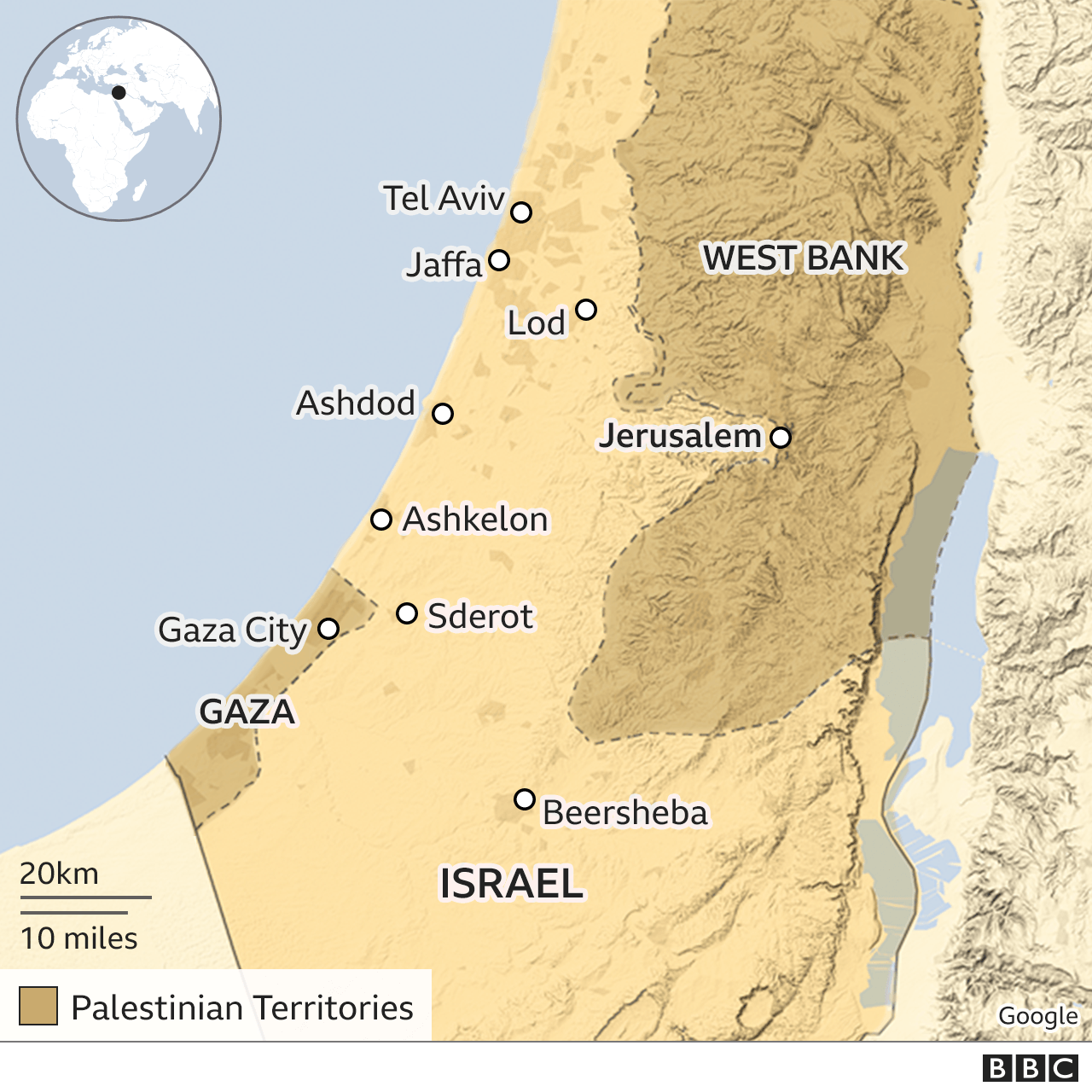

What caused the violence?
The fighting between Israel and Hamas was triggered by days of escalating clashes between Palestinians and Israeli police at a holy hilltop compound in East Jerusalem.
The site is revered by both Muslims, who call it the Haram al-Sharif (Noble Sanctuary), and Jews, for whom it is known as the Temple Mount. Hamas demanded Israel remove police from there and the nearby predominantly Arab district of Sheikh Jarrah, where Palestinian families face eviction by Jewish settlers. Hamas launched rockets when its ultimatum went unheeded.
Palestinian anger had already been stoked by weeks of rising tension in East Jerusalem, inflamed by a series of confrontations with police since the start of Ramadan in mid-April.
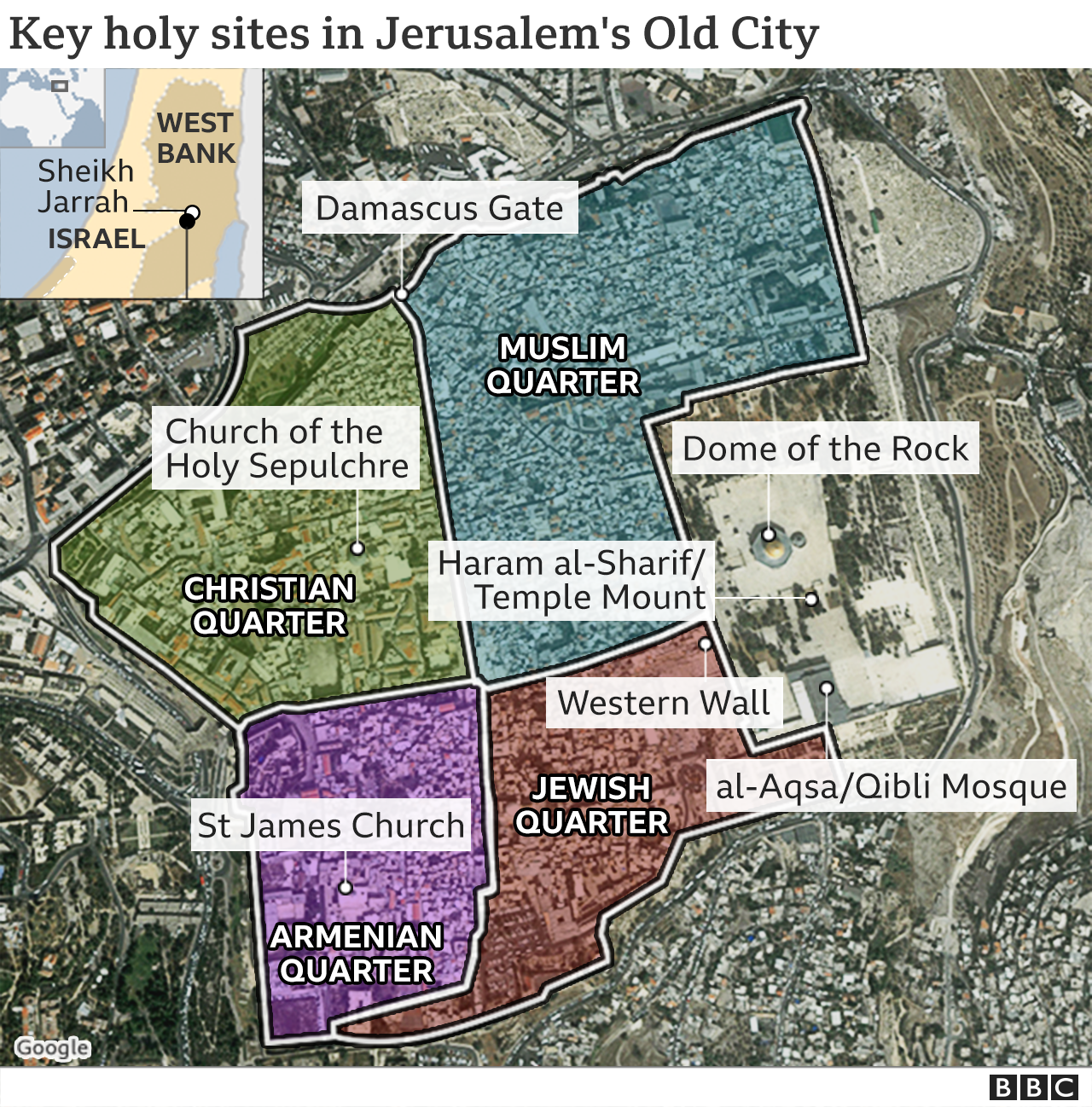

It was further fuelled by Israel's annual celebration of its capture of East Jerusalem in the 1967 Middle East war, known as Jerusalem Day.
The fate of the city, with its deep religious and national significance to both sides, lies at the heart of the decades-old Israel-Palestinian conflict. Israel in effect annexed East Jerusalem in 1980 and considers the entire city its capital, though this is not recognised by the vast majority of other countries.
Palestinians claim the eastern half of Jerusalem as the capital of a hoped-for state of their own.

Are you in Israel or Gaza and affected by these events? Email haveyoursay@bbc.co.uk.
Please include a contact number if you are willing to speak to a BBC journalist. You can also get in touch in the following ways:
- WhatsApp: +44 7756 165803
- Tweet: @BBC_HaveYourSay
- Upload pictures or video
- Please read our terms & conditions and privacy policy
If you are reading this page and can't see the form you will need to visit the mobile version of the BBC website to submit your question or comment or you can email us at HaveYourSay@bbc.co.uk. Please include your name, age and location with any submission.
"day" - Google News
May 15, 2021 at 12:09AM
https://ift.tt/2R8reJz
Israel intensifies attacks in Gaza as conflict enters fifth day - BBC News
"day" - Google News
https://ift.tt/3f7h3fo
https://ift.tt/2VYSiKW
Bagikan Berita Ini














0 Response to "Israel intensifies attacks in Gaza as conflict enters fifth day - BBC News"
Post a Comment